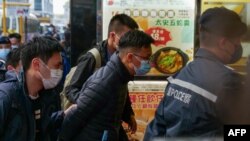Two former chief editors of a now-shuttered media outlet in Hong Kong went on trial Monday for publishing "seditious" content, the latest prosecution of journalists in the business hub.
Sedition, a once little-used hangover from the British colonial period, has been embraced by prosecutors alongside a new national security law as China cracks down on dissent after democracy protests three years ago.
Chung Pui-kuen, 52, and Patrick Lam, 34, were jointly charged alongside Stand News' parent company Best Pencil Limited, of "conspiracy to publish and reproduce seditious publications."
The two journalists, who have been detained for the last 10 months, have pleaded not guilty and face up to two years in jail if convicted.
Stand News was a popular online news portal that provided detailed and often sympathetic coverage of Hong Kong's democracy protests and the clampdown that followed.
National security police raided its offices late last year and froze HK$61 million (US$7.8 million) of the company's assets.
Stand News folded soon afterwards and deleted its content.
Prosecutors accuse Chung and Lam of "inciting hatred" against authorities with 17 articles and three videos published on Stand News.
The trial is being overseen by Kwok Wai-kin; a District Court judge handpicked by the government to try national security offences.
Sedition was wielded by Colonial Britain against pro-China leftist newspapers in the 1950s and 1960s during periods of social unrest.
It fell into disuse for decades afterwards until police dusted the law off in the aftermath of 2019's huge and sometimes violent democracy rallies.
More than 220 people — the bulk of them activists, former elected lawmakers, unionists and journalists — have been arrested on national security charges since Beijing imposed the sweeping law in mid-2020.
About one-fifth of those arrested have been hit with charges of sedition.
Recent jailings under sedition include a group of unionists who published a series of children's books about the democracy protests, two people who applauded and shouted slogans and a court hearing and an online radio host who broadcast fiery criticisms of the government.
National security charges, including sedition, were also brought against Apple Daily, a popular pro-democracy tabloid that also folded when its assets were frozen.
Senior executives, including its jailed owner Jimmy Lai, are set to go on trial in December.
Critics say Hong Kong's national security campaign has eviscerated freedoms and begun transforming the city's legal system.
Beijing says order has been restored in the wake of the demonstrations.
Earlier this year, Hong Kong plunged 68 places in an annual press freedom ranking by Reporters Without Borders to 148th, sandwiching the business hub between the Philippines and Turkey.
In RSF's first report in 2002, Hong Kong had some of the freest media in Asia and ranked 18th worldwide.




